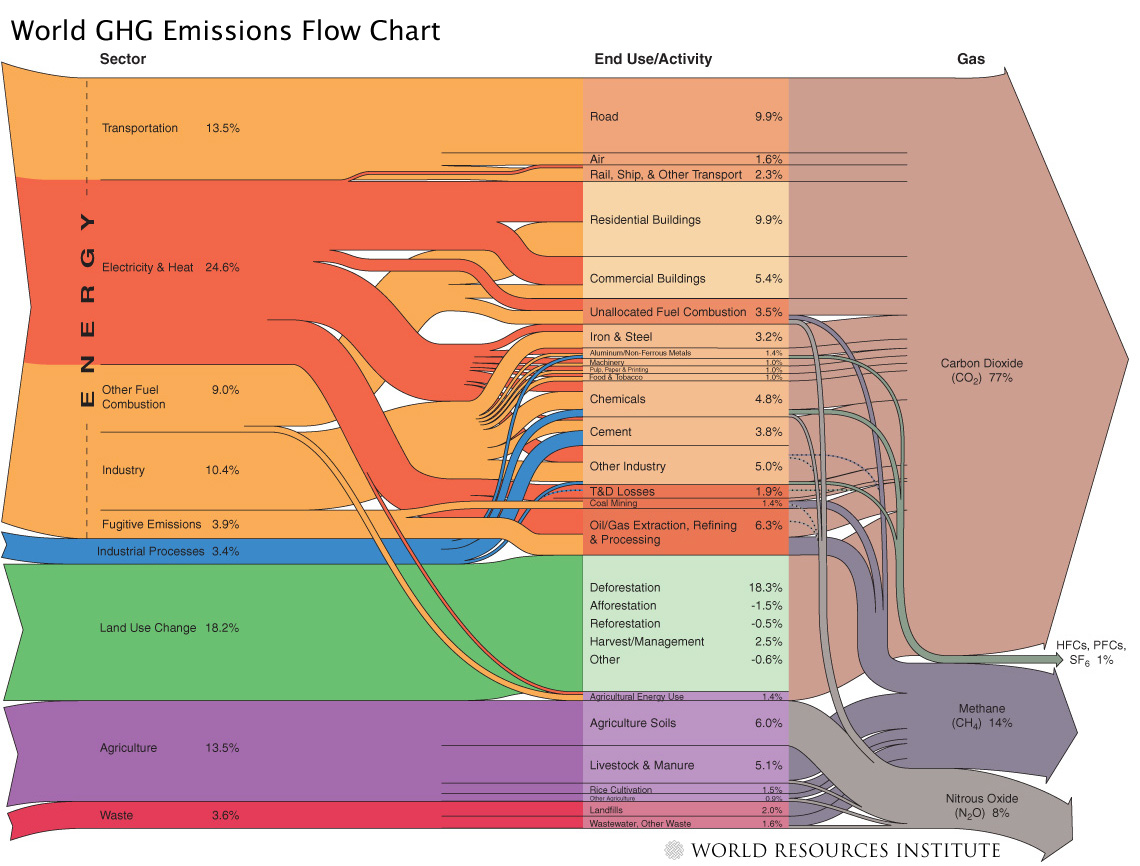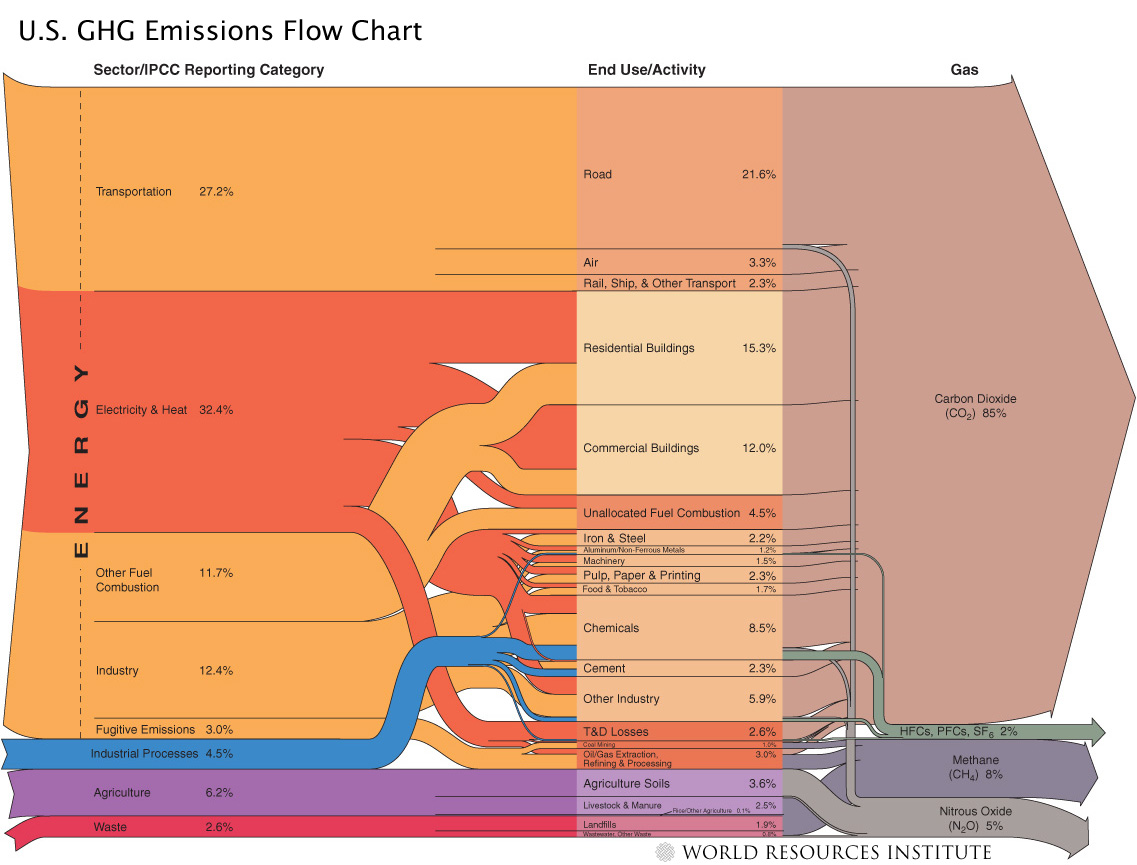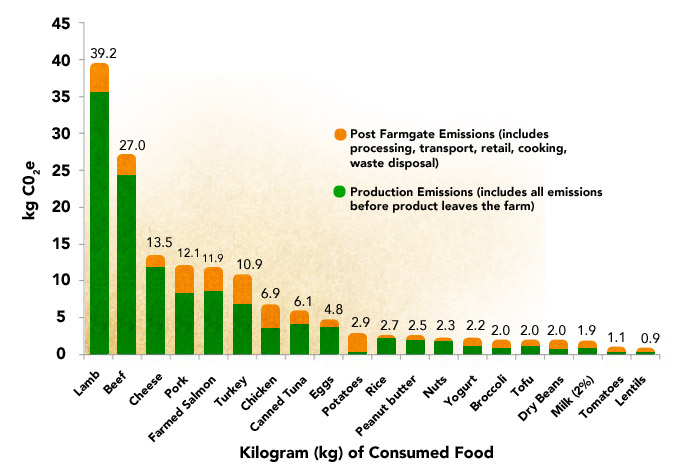How much does animal agriculture and eating meat contribute to global warming?
Posted on 30 November 2015 by dana1981
This is the new rebuttal to the myth 'animal agriculture and eating meat are the biggest causes of global warming.' It's available at the short URL sks.to/meat
The burning of fossil fuels for energy and animal agriculture are two of the biggest contributors to global warming, along with deforestation. Globally, fossil fuel-based energy is responsible for about 60% of human greenhouse gas emissions, with deforestation at about 18%, and animal agriculture between 14% and 18% (estimates from the World Resources Institute, UN Food and Agriculture Organization, and Pitesky et al. 2009).
Global human greenhouse gas emissions flowchart, from the World Resources Institute.
So, animal agriculture and meat consumption are significant contributors to global warming, but far less so than fossil fuel combustion. Moreover, fossil fuels are an even bigger contributor to the problem in developed countries, which use more energy and have increased livestock production efficiency (Pitesky et al. 2009). For example, in the United States, fossil fuel-based energy is responsible for about 80% of total greenhouse gasemissions as compared to about 6% from animal agriculture (estimates from the World Resources Institute and Pitesky et al. 2009).
US human greenhouse gas emissions flowchart, from the World Resources Institute.
How does animal agriculture cause global warming?
On of the main ways in which the livestock sector contributes to global warming is throughdeforestation caused by expansion of pasture land and arable land used to grow feedcrops. Overall, animal agriculture is responsible for about 9% of human-caused carbon dioxideemissions globally (UN FAO).
Animal agriculture is also a significant source of other greenhouse gases. For example, ruminant animals like cattle produce methane, which is a greenhouse gas about 20 times more potent than carbon dioxide. The livestock sector is responsible for about 37% of human-caused methane emissions, and about 65% of human nitrous oxide emissions (mainly from manure), globally (UN FAO).
Beef is a bigger problem than other sources of meat
Producing beef requires significantly more resources (e.g. land, fertilizer, and water) than other sources of meat. As ruminant animals, cattle also produce methane that othersources (e.g. pigs and chickens) don't.
Eschel et al. 2014 estimated that producing beef requires 28 times more land, 6 times more fertilizer and 11 times more water than producing pork or chicken. As a result, the study estimated that producing beef releases 4 times more greenhouse gases than a calorie-equivalent amount of pork, and 5 times as much as an equivalent amount of poultry.
Eating vegetables produces lower greenhouse gas emissions yet. For example, potatoes, rice, and broccoli produce approximately 3–5 times lower emissions than an equivalent mass of poultry and pork (Environmental Working Group 2011). The reason is simple – it's more efficient to grow a crop and eat it than to grow a crop, feed it to an animal as it builds up muscle mass, then eat the animal.
Greenhouse gas lifecycle assessment for common proteins and vegetables (EWG 2011).
How do the numbers get misrepresented?
There are often suggestions that going vegan is the most important step people can take to solve the global warming problem. While reducing meat consumption (particularly beef and lamb) reduces greenhouse gas emissions, this claim is an exaggeration.
An oft-used comparison is that globally, animal agriculture is responsible for a larger proportion of human-caused greenhouse gas emissions (14-18%) than transportation (13.5%). While this is true, transportation is just one of the many sources of human fossil fuel combustion. Electricity and heat generation account for about 25% of global humangreenhouse gas emissions alone.
Moreover, in developed countries where the 'veganism will solve the problem' argument is most frequently made, animal agriculture is responsible for an even smaller share of the global warming problem than fossil fuels. For example, in the USA, fossil fuels are responsible for over 10 times more human-caused greenhouse gas emissions than animal agriculture.
That's not to minimize the significant global warming impact of animal agriculture (as well as its other adverse environmental impacts), especially from beef and lamb, but it's also important not to exaggerate its contribution or minimize the much larger contribution of fossil fuels.































 Arguments
Arguments

































@ scaddenp,
Well there are a lot of considerations my friend. Not sure exactly what you are getting at.
The general rule of thumb is that carbon improves the cation exchange capacity of soil, which makes for more efficient use of all nutrients including Nitrogen.
Black Carbon Increases Cation Exchange Capacity in Soils
One of the benefits of mycorrhyzal fungi symbiosis is a far more efficient use of nitrogen. The fungi trades this for sugars that ultimately become part of the LCP (Liquid Carbon Pathway).
So over fertilizing with nitrogen means the plant has no need for the symbiosis. Less carbon gets sequestered by the LCP. It's even worse with phosphorus cycle. That will shut down the LCP completely even in some cases killing off the AMF. Once they are gone the nitrogen and phosophorus will leach rapidly. Lower carbon lower cation exchange capacity, lower efficiency of use of fertilizers, more being applied and more leaching. It is a downward spiral until the soil essentially gets beat to death so badly it is no longer arable.
But there is a different side to it as well. Carbon will hold nitrogen and help prevent its leaching too. But if the carbon is the labile fraction of soil carbon, then the effect is both temporary and will eventually result in excess CO2 production. It can in certain cases even cause well stabilized humus to break down into CO2 too.
I hope that gives you a general gist and for more details, just be more specific and I will reply with references in greater detail too.
PS You mean plantains like bananas? Or plantains like genus Plantago?
Thanks very much. That is the general gist that I wanted. And plantago cultivars is what is being pushed.
Thank you for this post.
I'm vegan and I do believe that most vegans, including main stream films such as Cowspiracy have exaggerated the part of animal agriculture in green gas emissions. This is a moot point though. Most decent vegans, with a scientific based mind, agree that veganism is an ethical stance beyond diet, and I'll add beyond any climate considerations. I simply believe that the gathering of sentient beings in what is truly equivalent to concentration camps for animals, is unethical and that's why I'm vegan. I don't need to tweak green gas emissions to feel better and legitimate my position.
How can you claim that deforestation contributes more to global warming than animal agriculture when cattle ranching alone is the main cause of deforestation???? Am I crazy for thinking that that's a blindlingly embarrassing flaw to this post???
https://www.worldwildlife.org/threats/deforestation
Thanks for a very informative post.
Is it not also worth considering the net GHG effect of animal agriculture? I.e. not just the basic carbon and methane emissions, but also the loss of potential carbon sequestration from the deforestation necessary to maintain the system?
.
If we look at various types of human land use change, it seems that the majority is for animal agriculture in 2 major forms; the largest being pasture land for grazing cattle, and sheep, etc. and the next largest being the amount of cropland farmed specifically as animal-feed for chicken, pigs and grain-fed factory farm cattle, etc.
Hence if we could end animal agriculture, restore pastures to forest for greater carbon sequestration, and use the cropland solely to feed the human vegan population, then would it not rank higher as a significant impact on reducing GHG's?
Certainly higher than energy and transport sectors, which have comparitively little deforestation footprints.
Just a thought..
The IPCC reports do account for effects of land use change in terms of carbon cover lost and change of albedo. Carbon losses from soil are not so well accounted for but note that deep prairie soils under grazing hold more carbon than forest. Farming in way that increases soil OC rather than deplete it is the challenge.